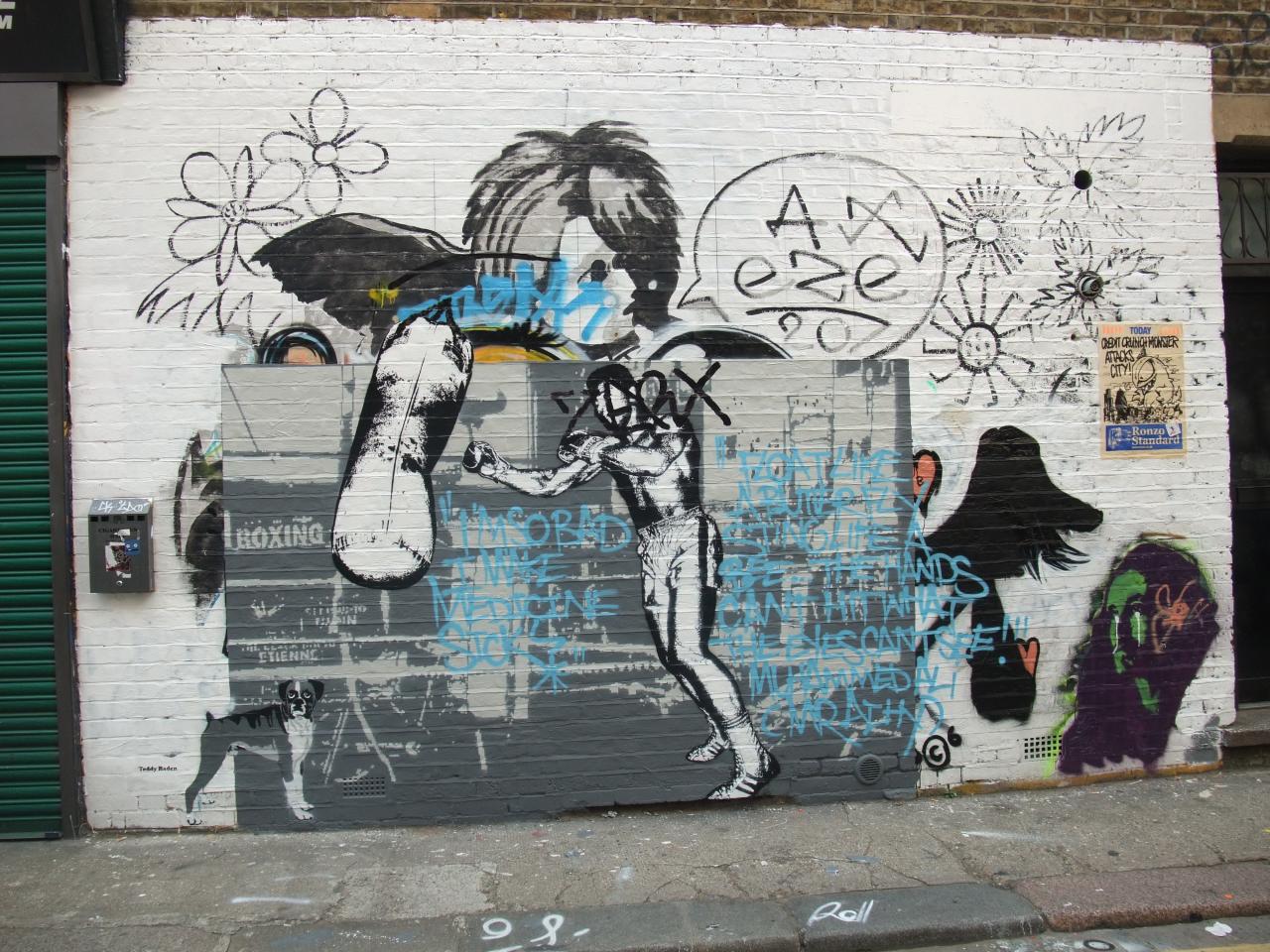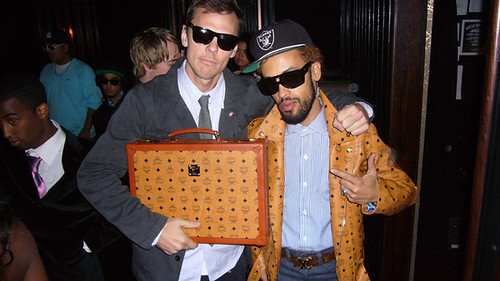Husky Brown Paints The Streets to Save Children
In Uganda
Above Street Art By Husky Brown
Husky Brown goes all out this weekend to raise money for the charity invisible Children. The project looked at working with some of the world top street artists in the UK to raise money for the charity. Project Organisers Creative Reason have been a fan of Husky's work and felt he was the artist who could relate to the project cause. Husky Brown painted a series of wall art on the walls in cities around the UK. Visiting a few of the key locations and talking to Jean O'Brien, from Creative Reason Project "Husky is a real talent and serious about helping the charity. We have been working closely with sportsmen and women on the project and its a fantastic achievement for us to be present with a real talented Artist for Uganda.
Since Invisible Children: Rough Cut was filmed in 2003, night commuting has ended for the children of northern Uganda. In recent years peace was seemingly within reach, largely due to the Juba Peace Talks. From June 2006 to March 2008 in Juba, Sudan, the Lord’s Resistance Army (LRA) and the Government of Uganda (GoU) engaged in a series of peace talks in order to end the conflict. These peace talks, supported by special envoys from the United States and other nations, allowed for the longest period of peace in northern Uganda’s 23-year war.
The Juba Peace Talks developed with hope for a lasting resolution, and concluded in March of 2008 with the Final Peace Agreement (FPA) ready for the signature of Joseph Kony and President Museveni. However, in April of 2008, Kony twice failed to appear and sign the FPA and officially ended the Juba talks mediated by the Southern Sudanese government. Joseph Kony’s stated reasons for not signing the FPA were a vague understanding of the treaty’s systems regarding post-conflict justice and an apprehension toward ICC warrants for him and four other LRA leaders. Since the collapse of the peace talks, the LRA has been active in the Democratic Republic of Congo (DRC), Central African Republic (CAR) and southern Sudan, drawing widespread disapproval from the international community and igniting a new urgency to end what has become a complex regional conflict.
Above: Street Art by Husky Brown 2011
In the last two years, an estimated 900,000 of the 1.8 million displaced have returned to their homes. But that leaves one million people currently living in the Internally Displaced Persons (IDP) camps. While the majority desires to return home, the issues surrounding their return are complex. Some have been displaced for more than a decade, and their former way of life is all but gone. Access to clean water, economic opportunities, health centers, and education are a pressing concern for all, and even more so for the many who contemplate returning to resource-barren villages.
A HISTORY OF AFRICA’S LONGEST RUNNING WAR
The war in northern Uganda has been called the most neglected humanitarian emergency in the world today. For the past 23 years, the Lord’s Resistance Army (LRA) and the Government of Uganda (GoU) have been waging a war that has left nearly two million innocent civilians caught in the middle. The GoU's attempt to protect its citizens from this rebel militia has largely failed, resulting in an entire generation of youth that has never known peace.
The LRA rebel movement can be traced back to a woman named Alice Lakwena. In the 1980s, Lakwena believed the Holy Spirit spoke to her and ordered her to overthrow the Ugandan government for being unjust to the Acholi. Lakwena and her followers, known as the Holy Spirit Movement, gained momentum as resentment toward the government increased. When Lakwena was exiled and no clear leader of the movement was left, Joseph Kony, who claimed to be Lakwena’s cousin, took control and transformed Lakwena’s rebel army into the LRA.
Kony's LRA did not receive the same support as the Holy Spirit Movement from the Acholi people. With dwindling approval for their cause and heightened government offensives, the rebels resorted to abducting children and indoctrinating them into their ranks. It is estimated that more than 90% of the LRA’s troops were abducted as children.
In 1996, as a response to the LRA attacks in the villages, the Ugandan government forcibly evicted thousands from their homes, relocating them into overcrowded camps in hopes of providing protection. But over a decade later, roughly one million individuals still live in these camps and struggle to survive among the effects of abject poverty, rampant disease, and near-certain starvation.
In recent years more and more international attention has been focused on this crisis. In 2001, the US Patriot Act officially declared the LRA to be a terrorist organization - a huge step in drawing attention to the conflict and the atrocities committed by the LRA. In 2004, Congress passed the Northern Uganda Crisis Response Act, the first piece of American legislation to address this disaster. And in 2005, the International Criminal Court (ICC) issued arrest warrants for Joseph Kony and four of his top commanders.
Pressure from the international community (particularly from EU and Canada) combined with a strong desire to secure peace has brought the Government of Uganda and the LRA to the negotiating table on numerous occasions, though they have yet to find a peaceful resolution. The most recent talks commenced in Juba, Sudan in July 2006, and a Cessation of Hostilities Agreement was signed the following month.
In July 2007, in response to an increased concern for peace in northern Uganda by the American people, the US State Department appointed Tim Shortley to Senior Advisor for Conflict Resolution with his immediate focus on northern Uganda. This action solidified the US’s commitment to end this conflict peacefully. That same year, the United Kingdom bolstered their commitment to peace by allocating £70 million in aid, while Germany committed to a 25% increase in aid to Uganda by October 2010. Canada later became more than an international supporter of the peace process in February 2008 by joining the peace talks as an official observer (though the Canadian officer on the ground has since been removed from the region).
At this point in time, the Cessation of Hostilities Agreement has expired and Joseph Kony has failed to sign the Final Peace Agreement for a fourth time, proving his promises to be futile and ultimately disabling the peace talks. Uncertainty lingers, not only for the thousands displaced in northern Uganda but across the entire northeastern border region of DR Congo, South Sudan, and Central African Republic.
Since September 2008, hostility in the Orientale province in DR Congo and Western Equatoria in South Sudan has reached a feverish pitch. LRA attacks have become more frequent and hostile, provoking military action against the rebel group. In an unprecedented joint military operation, the governments of Uganda, DR Congo, South Sudan and the Central African Republic launched an attack on LRA strongholds within DR Congo. “Operation Lightning Thunder”, the name designated for the counteroffensive, was largely unsuccessful in light of both the failure to reach top LRA leadership and the onslaught of violence that followed.
One month later on December 24th, 2008, the LRA launched a retaliatory attack against the people of DR Congo. In apparent desperation and a renewed will to spread terror to DR Congo, the LRA murdered over six hundred and abducted more than one hundred and sixty children to fight amongst its ranks. More than 104,000 Congolese have been displaced since Christmas in attempts to escape the LRA forces.
As the motives of the LRA become more ambiguous and their crimes more horrific, Invisible Children remains committed to seeking sustainable solutions to foster an environment that encourages peace. We are supporting and equipping a generation ravaged by war so that they can finally know peace. Invisible Children addresses the need for access to education and economic development through innovative programs on the ground. To learn more about these programs and how you can contribute to lasting peace and development click here.
"I was supporting kids in schools who would of been permanently excluded and they was invited to meet some speakers from the US about the charity. At first I never knew much about Invisible Children but new about Child Soldiers. I watched some graphic videos at the speech and this changed my ignorance to lack of knowledge. The video highlighting teenage boys and girls being kidnapped by armed rebelled soldiers in Uganda for civil war. Kids captured and poisoned for killing. The video made me vex, to the point where I wanted to be involved with awareness of the charity in Britain". - Husky Brown
We are story tellers. We make documentaries about war-affected children in east Africa and tour them around the world.
We use the power of media to inspire young people to help end the longest running war in Africa. Our model has proven effective, and hundreds of thousands of people have been called to action through our films and the volunteers that tour them.
We are made up of a tireless staff, hundreds of full time volunteers, and thousands of students and supporters. We are young, we are citizens of the world, we are artists, activists, and entrepreneurs. This fall, we are using our voice to ask President Obama to spearhead efforts to bring peace to Northern Uganda. We are mobilizing a generation to capture the attention of the international community, and make a stand for justice in the wake of genocide.
But our work extends far beyond story telling.
With the support we receive from our tours and young supporters, we are able to implement cutting edge programs on the ground in Uganda. To prioritize and understand the needs of the community, our Uganda staff is 95% Ugandan. We focus on long-term development, working directly with individuals and institutions, to best understand the needs of these war-effected areas. We rebuild schools devastated by war, benefiting over 8,400 Ugandan youth in the areas of water and sanitation, books and equipment, refurbishment of structures, teacher support, and technology and power. We provide 690 scholarships to specifically chosen secondary students and 180 full ride scholarships to University. We employ mentors that holistically oversee healthy development for our students. We have also implemented micro-economic initiatives that are impacting 360 Ugandan’s in transition from internally displaced camps to their original homes as well as 13 formerly abducted child mothers who are now self-sufficient through our tailoring center that provides training in savings, investment, numeracy, literacy and health. These savings-and-loans initiatives have allowed villagers to save money and earn interest for the first time, freeing them to start their own businesses and provide for their families like never before.
We believe that the problems of central Africa need to be tackled comprehensively, from peace to education. Solving them is no easy task, and it will take all of us doing all that we can to ensure it. Join us in the race for peace, click here to find out what you can do to get involved.































































Canberra, ACT